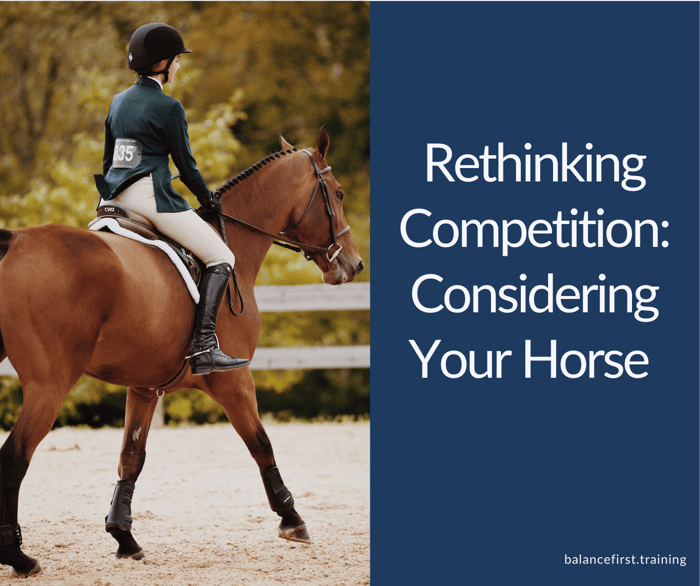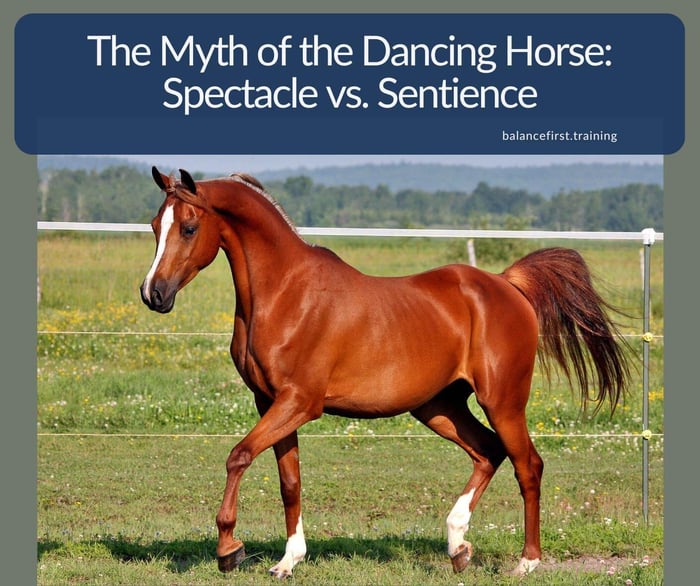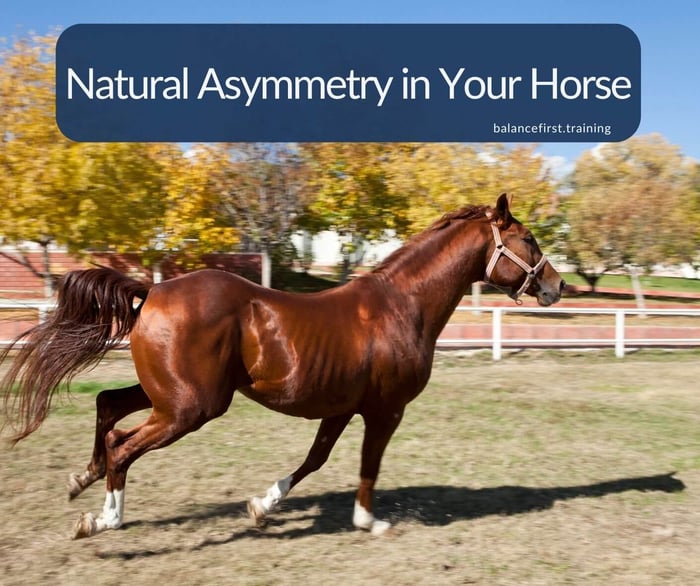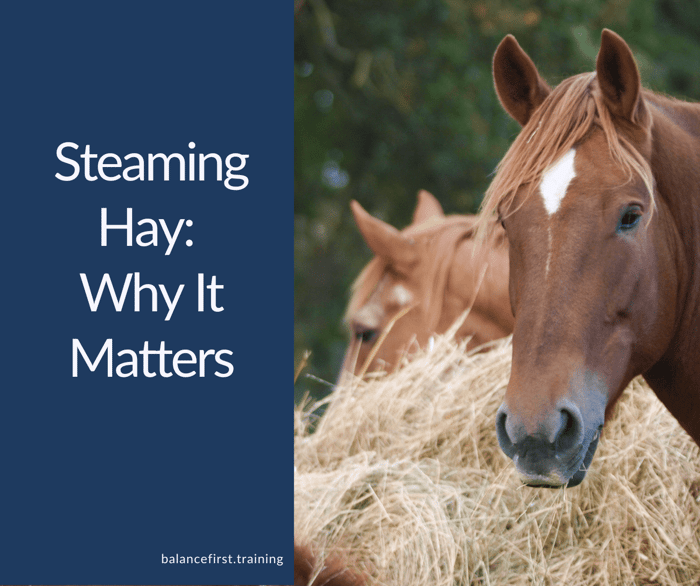Table of Contents
Rethinking Competition: Considering Your Horse.
While competition can sometimes be associated with pressure and performance-driven training, it also presents meaningful opportunities for growth for both horses and their humans. When approached with empathy and awareness, competing can build confidence, deepen the horse-rider partnership, and provide structure for progressive development.
For some horses, the stimulation of new environments and challenges can be enriching, especially when their physical and emotional needs are well supported. The key lies in prioritizing the horse’s well-being above the pursuit of ribbons—ensuring that every step toward the arena is one taken in balance, trust, and mutual respect.

My experience
For me, it didn't work out that way. Like most people, when I first started riding and owning my own horse, I felt like competing was just what you have to do, so I started riding in local dressage competitions.
A typical competition involved a lot of preparation, including getting - and keeping - everything clean (so much cleaning!).
Plus all sorts of emotional turmoil. Feeling sick with nerves, having thoughts like:
- "I'm not good enough."
- "What will people think of me?"
- "All the gear, not a clue!" (This part was true 😂)
In the warm-up arena, the other horses would often be excitable - and not entirely under control. The other riders would be intimidating and difficult to avoid. Sometimes it would be very crowded and really quite dangerous. Often, the horses were treated harshly in the warm-up arena, which would also frighten my horse.
Then, in the competition arena, I would stop breathing properly, my body tensed, and my horse would notice the change in me and stiffen. I would ride badly, and my horse became confused.
In this situation, my horse simply couldn't perform.
This made me feel frustrated and useless. And my horse felt that.
The judge would give me a score and some very brief, and frankly not very helpful, comments. Depending on who else turned up on the day, I might even get a rosette.
Afterwards, I would congratulate myself for going through with it and surviving. Pretending everything was OK.
But the frustration built up inside. The desire to do better, to be better, can make you push your horse too much and punish yourself for not being good enough.
My horse's welfare was suddenly no longer my highest priority. I had lost the wonderful relationship we once had, and the happiness I once felt just being in his presence had vanished.

What about you?
You will never be the best - however good you get, there will ALWAYS be someone better than you!If you feel a strong need to compete, try to figure out where that is coming from. I would challenge you to think about why that is:
- Do you want to prove yourself?
- Do you have a need to feel more significant? Want to be noticed?
- Are you trying to meet someone else's expectations, family, friends, or trainer, for example?
- Do you crave approval from others?
- Do you imagine everything will come right in your life if you can just win the next competition or get those points?
- Do you imagine people will love you if you win? (In my experience, the opposite is true.)
- Do you need to justify the cost of keeping your horse?
- Something else?
What about your horse?
There are certainly positives for the horse. It adds some varieity to their lives, they get to see a bit more of the world, they might enjoy the experience.
But horses are prey animals and herd animals. They have to leave their routine, their herd, to travel. They might be pushed well into their stress zone - fight, flight, or freeze.
From a physical and mental perspective, think about what a human athlete goes through: the pain of injuries, the stress of the experience, the stress of travelling and time away from home, the physical exhaustion, the mental toll, and the tough discipline required to keep going.
A successful athlete risks everything when they compete; they regularly push their bodies to the limit.

The competition horse experiences all of that, but they have no choice; they simply have to do it.
They also have to deal with the emotional trauma and inconsistency of the rider, often varying levels of tough training at home with unrealistic and unfair expectations, plus there can be physical and/or emotional punishment when it all goes wrong.
The human athlete can choose. The equine athlete has no voice.The reality
- The requirements for competitions do not always have the welfare of the animal as the first priority (despite what they officially say).
- Competing in itself does not improve you. It does not make you a better rider or horseman/woman. A good horseman/woman will always put the welfare of the horse above anything else.
- There are many great judges out there doing their best to help riders for the sake of the horse. But they have their own ideals, which may not be the same as yours.
- The judges don't know the journey you have been on, and they can only see this hot mess that's in front of them. A moment in time. A snapshot - and not your best one!
- Riding a horse in tension, under pressure, and exposing your horse to the worst side of your character is not in his best interests. In fact, it can damage him physically, mentally, and emotionally.
- Whether you win or not depends on who turns up on the day. It is entirely random! You may well be ranked low because you are competing against professionals training their young horses, or because a poor rider has turned up with an expensive ex-competition horse. Or you may win because the others were complete beginners.
- The stress of competition can damage the trust between you and your horse.
- If you really want a rosette, you can go online and buy a hundred of them - and a gold medal!
- It's better to work on constant and never-ending improvement of yourself and your horse at home. Take your horse to a horse-friendly training event that will be a fun day out for both of you, and at the same time improve your skills as a trainer/rider, instead of putting pressure on to win.
- It's perfectly possible to enjoy training and riding your horse with his/her health and mental well-being as the highest priority.
- You don't have to compete your horse to justify owning him.
- You don't have to compete with a horse to prove yourself.
- You don't have to compete to impress your family, trainer, friends, or people at your yard. Instead, work on yourself to impress your horse.

Are you a competitive person?
If you are highly competitive, I would urge you to consider taking up another sport that doesn't involve an animal, like cycling, motocross, football, or archery.
If both you and your horse genuinely enjoy it, that's great.
But think about why you do it, and if it is truly in the best interests of your horse.
- What is driving you?
- Is it benefiting your horse or damaging him?
Do you really want to strive to be like the professionals (maybe you are a professional) when, at the highest levels, we see a multitude of abuses against horses to get them to perform like distorted puppets in a way that pleases the judge on the day?
Casual abuses in the warm-up ring are ignored because they are so common that they are seen as normal - extremely tight nosebands, blue tongues, hyperflexion (rolkur), heavy hands, driving seats, overuse of whip and spurs, etc.
If that is what professionals are willing to show to the public, what on earth goes on behind closed doors?

Racing, eventing, showjumping, polo, showing, dressage - all sports in which animals are used have huge ethical problems.
Pick your ambitions with careWhat's the alternative?
Stop and enjoy your horse! They have so much more to offer.
Learn how to teach him to do pretty much anything. Learn how to communicate and understand him. Spend quality time together, build a connection, and develop a rewarding relationship. Become a better horseman/woman. Become a better version of yourself. Do things you can both enjoy together.

With the concepts and exercises we use in Balance First, you can learn how to improve your horse's performance by gently supplying soft tissue and addressing the natural asymmetries, which will improve strength and coordination and teach the horse to carry himself in a healthy posture. It can be an add-on to any discipline, and will benefit all horses, including and especially competition horses. Find out more
FAQs
Is competition harmful to horses?
Not inherently. The impact depends on how the horse is prepared, supported, and understood. When training prioritizes well-being, competition can be enriching. But when pressure overrides care, it can lead to physical strain and emotional shutdown.
Can horses enjoy competing?
Some horses appear to thrive in structured environments and enjoy the stimulation of new settings. However, enjoyment is often misread. True enthusiasm comes from confidence, trust, and freedom from fear-based training.
What are signs that a horse is stressed by competition?
Common signs include tension in the body, reluctance to load or enter the arena, pinned ears, grinding teeth, or shutdown behavior. These may be subtle and mistaken for “focus” or “obedience”.
How can I prepare my horse ethically for competition?
Focus on biomechanical integrity, emotional safety, and gradual exposure. Use positive reinforcement, allow choice, and ensure your horse is physically ready before asking for complex movements.
Is it possible to compete and still follow a holistic philosophy?
Absolutely. Holistic horsemanship isn’t anti-competition, it’s pro-welfare. It means listening to your horse, respecting their limits, and redefining success beyond ribbons and rankings.
What alternatives exist for horses who don’t enjoy competition?
Liberty work, trail riding, groundwork, and educational demonstrations can offer enrichment without pressure. Many horses thrive in environments that prioritize connection over performance.


.JPG)


